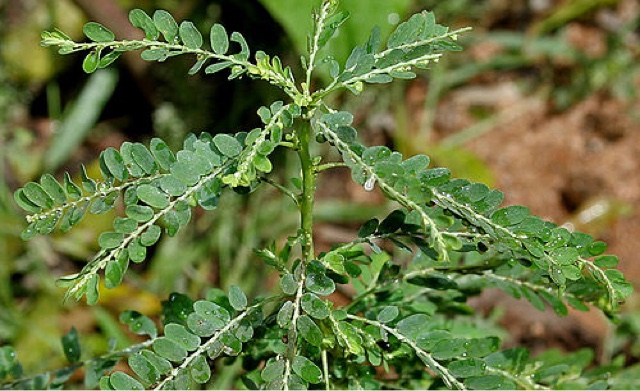Sat, 14 Mar 2015 | Medicinal Plants
(Euphorbiaceae)
Phyllanthus amarus herbs
Description:
Phyllanthus amarus Schum. & Thonn is a small herbaceous annual plant that can grow up to 60
cm tall. Leaves are simple, alternate, green and stipulate. The blade is 3-8 mm by 2-4.5 mm and
oblong-elliptic. The fruits are green, depressed globose in shape, 3-lobed and smooth. Both the
flowers and fruits are borne under the branches/1'21
Origin:
Native to Mexico and South America.
Phytoconstituents:
Phyllanthusin D, geraniin, corilagin, elaeocarpusin, ama-riin, amariinic acid, amarosterol-A and B,
phyllantin, hypophyllantin and others.
Traditional Medicinal Uses:
The aerial part of the plant is used for various conditions. In Chinese medicine, the plant is made
into a tea to cure kidney problems, venereal diseases, stones in the kidneys and bladder. The
Malays use it to increase menstrual flow, reduce fever and cure colic. It is used by the Indians as a
fish poison. Indians also use the plant as liver tonic to treat liver ailments, ascites, jaundice,
diarrhoea, dysentery, intermittent fever, conditions of the urogenital tract, eye disease, scabies,
ulcers and wounds. In Vietnam, it is used to induce sweating, and increase menstrual flow. It is
also prescribed for toothache, muscle spasms and gonorrhoea. It is considered a diuretic, colic
remedy and abortifacient in Southeast Asia. It is also commonly used in Benin, Africa, as folk
medicine against malaria.
Pharmacological Activities:
Analgesic, Antibacterial, Antidiarrhoeal, Antifertility, Antifungal, Anti-inflammatory, Antineoplastic,
Antioxidant, Antiplasmodial, Antiviral, Diuretics, Hepatoprotective, Hypoglycaemic, Inhibition of
gastric lesion, Antimutagenic, Insecticidal and Radioprotective.
Dosage:
A decoction may be prepared with 10 plants in 1 L of water.
Adverse Reactions:
No known side effects with therapeutic dosages.
Toxicity:
Non-toxic to mice at a dose of 100 mg/kg body weight but at doses of 400 mg/kg, 800 mg/kg and
1000 mg/kg body weight in rats.
Contraindications: No information as yet.
Drug-Herb Interactions: An alcoholic extract of P. amarus was found to inhibit cytochrome P450
enzymes both in vivo as well as in vitro.

No hay comentarios:
Publicar un comentario